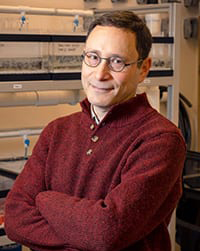Description
Title: "From planarians to parasites: stem cells and developmental plasticity in flatworms”
Speaker:  Phil Newmark, PhD
Phil Newmark, PhD
Investigator, Burnell R. Roberts Chair in Regenerative Biology
Morgridge Institute for Research
Madison, WI
Abstract: Schistosomes are parasitic flatworms that infect hundreds of millions of people. Passage through their complex life cycle requires two distinct hosts and several different body plans. Our recent work has shown that both adult and larval schistosomes possess stem cells similar to those of planarians, free-living flatworms with amazing regenerative abilities. Single-cell transcriptomic analysis on these cells isolated from larval-stage (i.e., intra-molluscan) schistosomes revealed three classes of larval stem cells. Upon infecting a mammalian host, the larval schistosome “transforms” into the next stage of the life cycle. During this “juvenile” stage, schistosomes undergo extensive tissue remodeling, massive growth, and development of the reproductive system, enabling them to live in the host vasculature and reproduce sexually. I will discuss our work to understand the role of the stem cells in early intra-mammalian development, and how this work has led us to identify a fascinating mechanism of host immune evasion.
Bio: Phillip Newmark is an Investigator of the Howard Hughes Medical Institute, Burnell Roberts Chair in Regenerative Biology at the Morgridge Institute for Research, and a Professor of Integrative Biology at the University of Wisconsin–Madison. He received his B.A. in biology from Boston University and his Ph.D. in molecular, cellular, and developmental biology from the University of Colorado at Boulder. As a postdoctoral fellow he sought to introduce molecular techniques to study planarian regeneration, a classic problem of developmental biology. Because there were no laboratories in the U.S. with expertise in planarian biology, he began his post-doctoral work as a Damon Runyon Fellow with Jaume Baguñà at the University of Barcelona. After learning the requisite planarian biology to initiate an independent line of research, he returned to the U.S., bringing his expertise on planarians and a thermos full of Schmidtea mediterranea to Alejandro Sánchez Alvarado’s laboratory at the Carnegie Institution’s Department of Embryology, which had previously focused on amphibian regeneration. Together, their work helped revitalize research on these fascinating organisms and permitted detailed analyses of the mechanisms underlying their amazing regenerative abilities. This work continued in his independent laboratory at the University of Illinois at Urbana-Champaign from 2001-2016, after which he moved to Madison. His current research seeks to understand how the planarian’s somatic stem cells produce the germ cells and various differentiated cells in the animal. His group has also been applying their knowledge about planarians to understand the biology of the planarian’s parasitic cousins, the schistosomes and tapeworms.
Date: Monday, November 15, 2021
Time: 12-1 pm
Location: Hill Pavilion, Room 132
University of Pennsylvania School of Veterinary Medicine
380 S University Ave, Philadelphia, PA 19104
You can also attend virtually. Virtual Link: Zoom
Questions? Please contact Sue Waddington-Pilder if you have questions (waddingt@vet.upenn.edu).